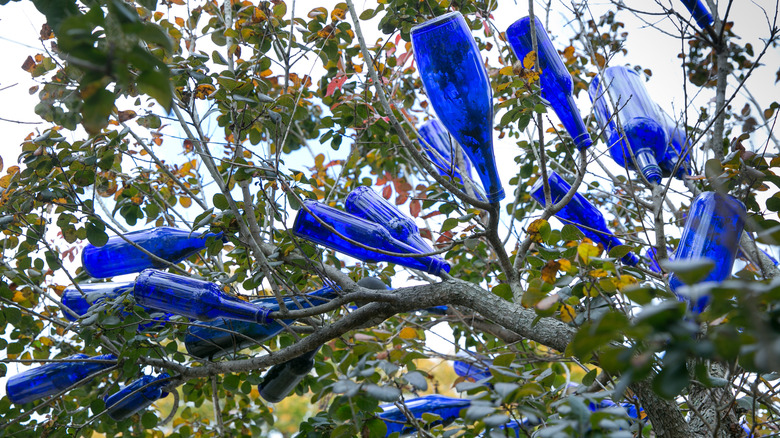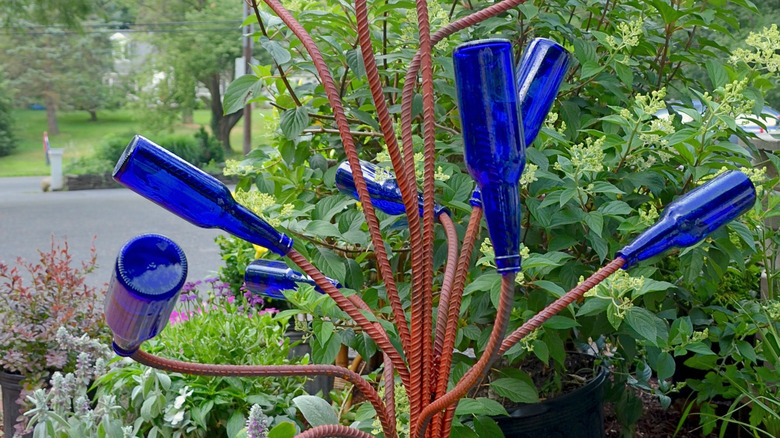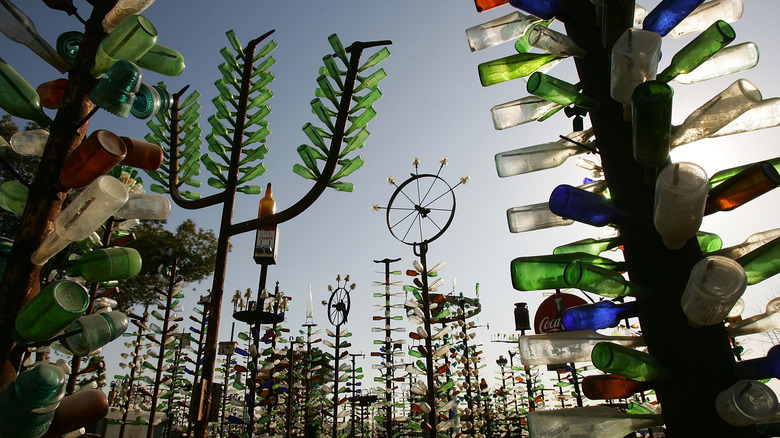What It Means If You See Glass Bottles Hanging From Someone's Tree
Visiting the American South, you may have spotted an unusual piece of folk art in a yard or garden. If you see colored bottles upended over the tips of tree branches or the arms of a metal stand, you're looking at what is called a bottle tree. Traditionally, bottles were posted on crepe myrtle, a tree that's symbolized freedom since biblical times. Sometimes cedar is used for its tendency to withstand rot. These days, though, core materials have been updated to include metal rods drilled into a base and then anchored in the ground. No matter what they're made from, though, bottle trees are a celebration of Southern culture, a respectful nod to generations of ancestors, and a paeon to the past.
The Mississippi Encyclopedia, from the University Press of Mississippi, indicates that the tradition of the bottle tree goes back to the ancient Kingdom of Kongo. In the ninth century, bottles may have been used to mark graveyards as part of a funeral ritual. By the 17th century, with the Atlantic slave trade at its height, displaced people continued the tradition, marking graves but also using what materials they could to create bottle trees. The belief was that sunlight reflected in the colored glass attracted sinister apparitions, trapping these spirits inside and preventing them from entering a nearby house. Another story says the glass draws the spirits into the bottles at night where they are trapped, and in the morning, the spirits are destroyed by sunlight.
Bottle tree beliefs were part of a worldwide tradition
Smithsonian Gardens describes how bottle trees, once ubiquitous in the southeastern United States, continue to maintain a presence as a cultural, spiritual, and historic icon today. Cobalt blue is the most popular glass color used because the color represents both water and sky, both attracting and confusing the spirits. Besides placement near a house, bottle trees were located near important meeting places and crossroads, to catch any wandering evil spirits. Wind blowing over a bottle's opening creates a moaning sound, and legend says this is an indication that a spirit is trapped inside. Historically, bottle trees were found from east Texas to northern Florida, but the tradition wandered north into Appalachia, and much further south into Caribbean countries as well.
It's worth commenting that the idea of glass fixtures warding off evil energy is rampant in stories throughout the world, and has been for centuries. In British folklore, the instrument for this task wasn't a bottle but a witch ball, a hollow glass globe. Hung at the entrance of a house or in a window, a glass ball would cause a witch to be trapped within. Alternatively, the reflective glass would cause a witch to curse her own reflection by mistake. Witch balls were popular in 17th and 18th century England and were brought to New England during this period. Bottle trees are just one version of this ancient tradition.
If you put up a bottle tree, do it to honor the past
As we've become better acquainted with scientific principles, the idea of evil spirits lurking about to cause harm is often discredited as superstition or fairytale. But just because we know now that certain conditions cause illness, and that germs cause infection, there's no reason to completely abandon the magical thinking bygone generations believed to be true. Installing a bottle tree in the garden today can be an homage to people of the past. Creating a tree is a nod to history, and a bit of culturally influenced art. Either way, constructing one can be every bit as respectful and reverently meaningful as trees made hundreds of years ago,
As their popularity as folk art grows, instructions on creating new bottle trees are readily available. Resources from TikTok, YouTube, Pinterest, and the Farmer's Almanac readily illustrate steps to create an authentic bottle tree in your yard. A quick internet search will also show you where to buy an entire tree from commercial vendors from Etsy to Amazon. Bloggers and landscapers who have installed a bottle tree indicate how much they appreciate the bits of glass reflecting color amid blooming flowers, almost like having a stained-glass window in your yard. Even if a bottle tree is not to your liking, maybe something else with glass or color would appeal. In general, from bottle trees to statuary, the garden is a fantastic space to showcase artwork.


